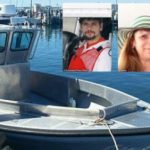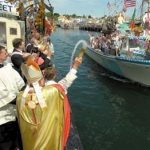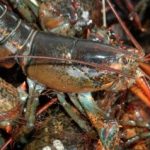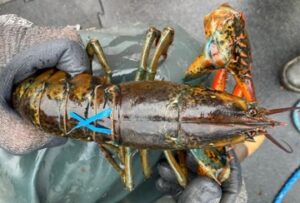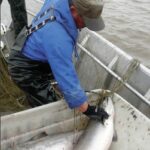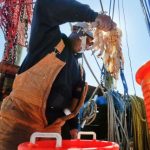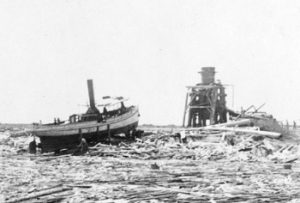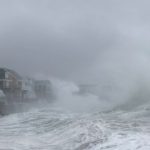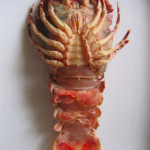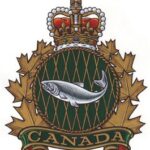Tag Archives: “marine protected areas”
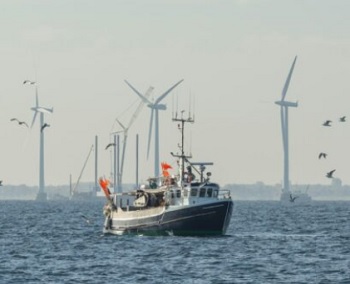
Fishermen feeling the squeeze as Scotland’s seas become overcrowded
Fishers are being crowded out of their traditional grounds by a combination of renewable energy developments and “excessive” conservation measures, they said. These pressures may lead to vast areas of Scottish waters being closed off or subjected to severe restrictions, they warned. “Coastal communities currently reap the benefits of the seafood brought back by our sustainable, modern, family-owned fishing fleet. “Profits from offshore windfarms will disappear into the budgets of private, wealthy, multinational energy firms.” >click to read< 10:05
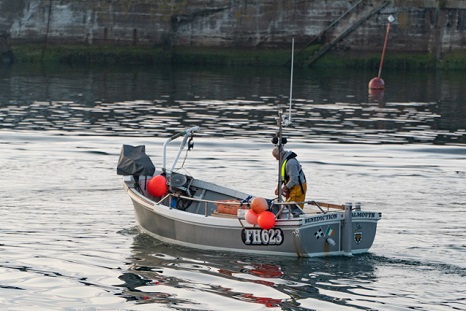
Who wants the disappearance of fishermen? The answers are here.
In recent months, worrying signs have multiplied indicating a desire, sometimes obvious, to make fishermen disappear or, very often, to marginalise them to make way for more lucrative activities in the Blue Economy.,, We are witnessing at sea, with the stranglehold of environmental NGOs on MPAs, the same phenomenon denounced by the historian Guillaume Blanc, in his book “Green Colonialism“: the grabbing of land in Africa, This is the case with the evolution of the marine world towards a “Blue colonialism” which is shamelessly displayed, multiplying MPAs prohibited to fishing, a subsistence and eminently sustainable practice of many oceanic peoples, and which, in Europe and elsewhere , only rarely involves small-scale fishermen in decisions about the oceans, of which they are nevertheless secular managers. >click to read< 07:52
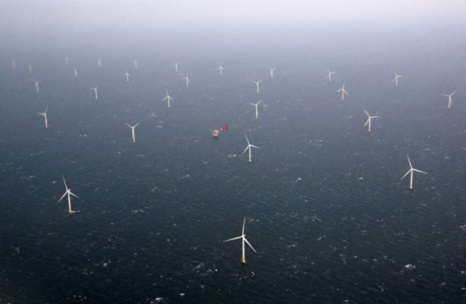
Forgotten industries – Auctioning off enormous areas of precious fishing grounds to offshore wind farm developers
At a time when Scottish fishing communities are still trying to come to terms with the regulations they face after the Westminster Government’s adoption of a Brexit deal,,, The Scottish Government appear to be intent on heaping more pressure on the Scottish fishing communities, as they are presently auctioning off enormous areas of precious fishing grounds to wind farm developers and are creating massive Marine Protected Areas, that prohibits fishing activities. This will concentrate the fishing effort in other areas, putting more pressure on the available fish stocks in what fishing grounds are left. By William Polson, Whalsay, Shetland. >click to read< 18:12
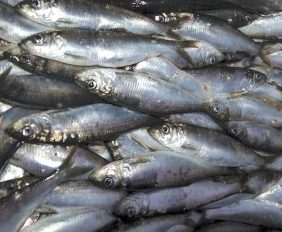
Statements about fisheries incorrect. To say that west coast salmon stocks are over fished is absolutely ludicrous.
To say that I’m disappointed in what Dr. Rashid Sumalia had to say about Marine Protected Areas is a gross understatement. Dr. Sumalia was very quick to point his finger at the salmon and herring fisheries in B.C. in his feeble attempt to discredit the west coast’s sustainable fisheries framework. To say that west coast salmon stocks are over fished is absolutely ludicrous. The commercial fishing sector has very few opportunities to actually fish, and when they do, they catch a fraction of what the sport fleet on the west coast catches. by Lance Underwood >click to read< 21:52
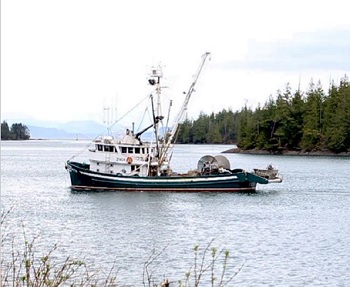
Commercial fishing concerns over marine protected areas, seek solutions through consultations
Bruce Turris, Brian Mose, Grant Dovey and Mike Atkins, who call themselves the ‘Marine Planning Team’ (MPT), is working on behalf of commercial fishermen in B.C.’s Northern Shelf Bioregion, and believe the input of fishermen is crucial to making sure the marine protected areas — which would either be off-limits to commercial fishing or see catch numbers greatly reduced — balance conservation with the needs of the fishing industry. >click to read<09:28
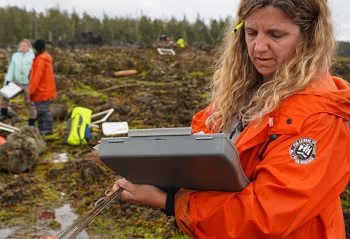
Marine Protected Areas: May or May Not Include Actual Protection
Clearly, a marine protected area is a region of the ocean—and the marine life therein—set aside to be preserved in its natural state, kept safe from human exploitation, right? If only it were that simple. MPAs can involve a spectrum of objectives from allowing sustainable fishing and gathering to protecting biodiversity to conserving sites of scientific or cultural interest. In the end, unless it is created and managed in accordance with globally recognized standards, an MPA is whatever a particular jurisdiction decides it will be. >click to read< 10:43

Dear editor: Government going overboard with Marine Protected Areas
The B.C. economy is set to lose hundreds of millions of dollars and few seem to be aware or care about this issue. The issue is the establishment of Marine Protected Areas (MPAs). Few would argue that MPAs can be beneficial, even commercial fishermen.,,, These B.C. fishermen work on the principle of sustainable yield,,,An estimate of the loss to the northern shelf alone ( north of Port Hardy) is $100 million per year! by George Dennis,
Comox >click to read< 15:20
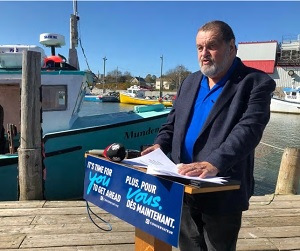
Conservatives announce fisheries plan, pledges to consult with communities on MPA’s, rebuilding fish stocks
Conservative candidates at four separate events in Atlantic Canada on Sunday unveiled the party’s plans to support the fisheries and to try to build consensus on how to restore fish stocks. In Glace Bay, N.S., Alfie MacLeod and Eddie Orrell announced their party will consult with communities on Marine Protected Areas (MPAs), commit an additional $250 million to the Small Craft Harbours program and create a “modern aquaculture act.” “We’ve seen how over the last four years Justin Trudeau has taken this province for granted,,, >click to read< 18:50
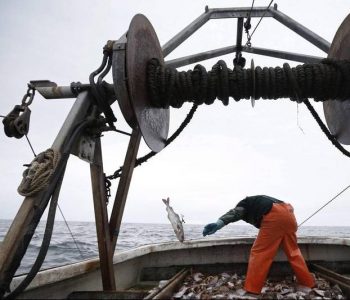
MPA’s: Trawlers allowed to fish in E.U. marine (un)protected areas – “We were surprised to find this,” said Boris Worm
Marine Protected Areas appear to not be particularly protected. At least not around Europe. A study released Thursday in the journal Science found that trawling efforts were about 36 per cent higher inside European Union Marine Protected Areas than it was outside of them. It also found that abundance of species often caught as bycatch in trawls, like sharks, skates and rays, was lower inside the heavily fished marine protected areas than outside. “We were surprised to find this,” said Boris Worm, a Dalhousie University marine ecologist who was also a senior author of the study. >click to read<19:45
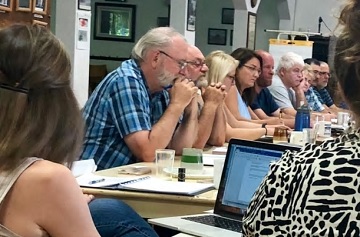
Mi’kmaq chiefs reject any ban on Indigenous fishing in marine protected areas
Nova Scotia Mi’kmaq chiefs say Indigenous fishermen should be exempt from any prohibition on fishing within marine protected areas because of First Nations’ treaty rights. “Our concerns and our input should have a greater weight in the decision making process than those of, for example, non-Mi’kmaw commercial fishers,” said Twila Gaudet, director of consultation for the Assembly of Nova Scotia Mi’kmaq Chiefs. That statement was part of a submission made to a federal advisory panel charged with developing standards for marine protected areas. The Trudeau government has committed to protect 10 per cent of coastal waters and oceans by 2020. >click to read<09:49

Trudeau government turns to senior Liberals, Indigenous on rules for MPA’s
The Trudeau government has named an advisory panel to navigate the stormy issue of what activities will and will not be allowed inside coastal waters and ocean designated as marine protected areas. Canada has promised to “protect” 10 per cent of marine waters by 2020, but what that means in terms of restrictions on fishing and other commercial activity has not been established. “We’re not there yet,” said Rémi Bujold, who co-chairs a seven-member advisory panel named Friday by the Department of Fisheries and Oceans. No one from the fishing industry is on the panel. >click to read< 07:46
Marine Protected Areas – Fishermen say Ottawa not clear on what potential protected areas will mean for fishing grounds
Cape Breton snow crab fisherman Basil MacLean speaks for many in coastal 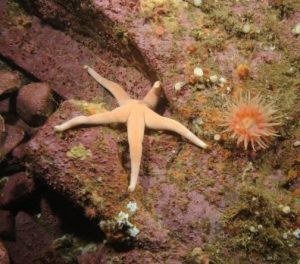 when he complains Ottawa has not been clear about what a potential marine protected area (MPA) will mean in his fishing grounds. “We’ve got no clarity. We got no idea what they want to protect,” he says. Earlier this year, officials with the Department of Fisheries and Oceans revealed an area known as the Cape Breton Trough in western Cape Breton is a potential candidate for designation as a marine protected area. The Trough overlaps the lucrative snow crab grounds known in DFO bureaucratise as Area 19. click here to read the story 11:41
when he complains Ottawa has not been clear about what a potential marine protected area (MPA) will mean in his fishing grounds. “We’ve got no clarity. We got no idea what they want to protect,” he says. Earlier this year, officials with the Department of Fisheries and Oceans revealed an area known as the Cape Breton Trough in western Cape Breton is a potential candidate for designation as a marine protected area. The Trough overlaps the lucrative snow crab grounds known in DFO bureaucratise as Area 19. click here to read the story 11:41
DFO will talk to Nova Scotia about growing number of Marine Protected Areas
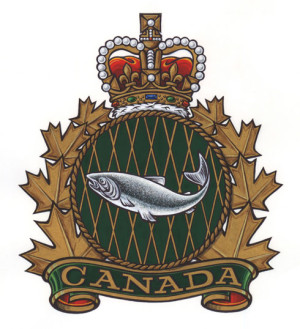 The Department of Fisheries and Oceans will meet with the province to discuss its concerns about the growing numbers of marine protected areas being designated off Nova Scotia, a department spokesman says. In April, the province asked Ottawa to stop making additional designations until other provinces and territories reach the same numbers achieved off Nova Scotia. The McNeil government is concerned the creation of more marine protected areas will have a negative impact on Nova Scotia’s economy. Marine-protected designations restrict human activities like fishing and offshore energy development. click here to read the story 11:30
The Department of Fisheries and Oceans will meet with the province to discuss its concerns about the growing numbers of marine protected areas being designated off Nova Scotia, a department spokesman says. In April, the province asked Ottawa to stop making additional designations until other provinces and territories reach the same numbers achieved off Nova Scotia. The McNeil government is concerned the creation of more marine protected areas will have a negative impact on Nova Scotia’s economy. Marine-protected designations restrict human activities like fishing and offshore energy development. click here to read the story 11:30
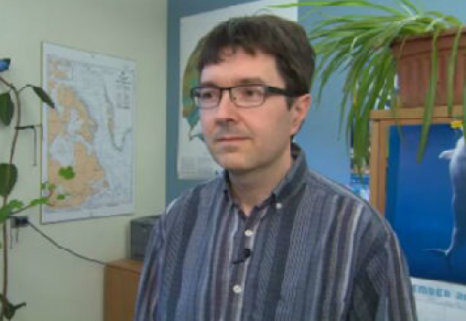
Industry has too much sway in Marine Protected Areas, says scientist
After a decade of deliberation, an ecologically sensitive area in the Laurentian Channel in the Gulf of St. Lawrence is entering the final stage of Marine Protected Area (MPA) status approval.
But Rodolphe Devillers, a geography professor at Memorial University who specializes in marine conservation, is skeptical about just how much protection the designation will provide. At just under 12,000 square kilometres, the Laurentian Channel Marine Protected Area will be the largest in Canada, and the third protected area in Newfoundland and Labrador. It falls between Cape Breton and Newfoundland’s southern shore, along the edge of the 3PS fishing zone.,,, But Devillers said the industry has far too much influence on the establishment of these areas. click here to read the story 09:35
Nova Scotia fishermen are concerned about proposed Marine Protected Areas (they should be!)
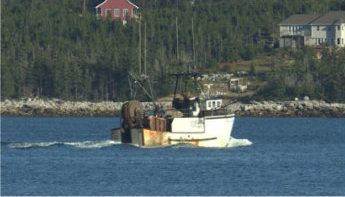 The federal Department of Fisheries and Oceans wants to double the number of marine protected areas around Nova Scotia next year. DFO is holding a series of consultation meetings with the public to get feedback to the idea. It identified 52 special areas within the 475,000-square-kilometre region along Nova Scotia’s Atlantic coast and in the Bay of Fundy that are in the running for the designation including the Sambro Ledges, Port Joli and Eastern Shore islands. Marty King, an oceans biologist with DFO, said the government will choose at least two areas to protect by next spring. But the proposed protections have fishermen worried. “They feel like they’re under siege sometimes,” said Peter Connors, president of the Eastern Shore Fishermen Protective Association. “I’m quite concerned.” “There’s fear of exclusion from the fish,” said Connors. “I think there’s a certain amount of evidence that that will take place.” Read the rest here 09:21
The federal Department of Fisheries and Oceans wants to double the number of marine protected areas around Nova Scotia next year. DFO is holding a series of consultation meetings with the public to get feedback to the idea. It identified 52 special areas within the 475,000-square-kilometre region along Nova Scotia’s Atlantic coast and in the Bay of Fundy that are in the running for the designation including the Sambro Ledges, Port Joli and Eastern Shore islands. Marty King, an oceans biologist with DFO, said the government will choose at least two areas to protect by next spring. But the proposed protections have fishermen worried. “They feel like they’re under siege sometimes,” said Peter Connors, president of the Eastern Shore Fishermen Protective Association. “I’m quite concerned.” “There’s fear of exclusion from the fish,” said Connors. “I think there’s a certain amount of evidence that that will take place.” Read the rest here 09:21
UK Overseas Territories Marine Protection Areas to double in four years
 Speaking ahead of “Our Ocean” conference in Washington DC, Foreign Office Minister Sir Alan Duncan announced plans to double the area of ocean under marine protection around the UK Overseas Territories to around four million square kilometers, greater than the landmass of India. This will involve the permanent closure of an additional one million square kilometers of ocean to commercial fishing, to preserve important marine life. The UK will pledge £20 million over the next four years to support the implementation, management, surveillance and crucially the enforcement of these new Marine Protected Areas (MPAs). Hosted by US Secretary of State John Kerry, the two-day Our Ocean conference will bring together governments, scientists, business leaders and NGOs from around the world to tackle threats to the ocean, including from marine pollution and the climate. Read the story here 16:20
Speaking ahead of “Our Ocean” conference in Washington DC, Foreign Office Minister Sir Alan Duncan announced plans to double the area of ocean under marine protection around the UK Overseas Territories to around four million square kilometers, greater than the landmass of India. This will involve the permanent closure of an additional one million square kilometers of ocean to commercial fishing, to preserve important marine life. The UK will pledge £20 million over the next four years to support the implementation, management, surveillance and crucially the enforcement of these new Marine Protected Areas (MPAs). Hosted by US Secretary of State John Kerry, the two-day Our Ocean conference will bring together governments, scientists, business leaders and NGOs from around the world to tackle threats to the ocean, including from marine pollution and the climate. Read the story here 16:20
California Marine Life Protection Act: The ultimate bait and switch
 There is no question that the passage of the Marine Life Protection Act (MLPA) has been the most controversial environmental issue California’s angling community has ever faced. It signaled the state’s shift from a shared philosophy of conserving California’s natural resources to outright protectionism, with little regard to the interests of outdoor recreation, tourism and all of their economic benefits. As the MLPA established the framework for Marine Protected Areas (MPAs), the state promised California anglers that areas designated as off-limits to commercial and recreational fishing may one day be open to fishing. In fact, they were very specific in their promises. Scientific assessments would be conducted every five years, and as fish populations were assessed as sustainably viable, the restrictions would be lifted. (But would they be?) Read the rest here 16:56
There is no question that the passage of the Marine Life Protection Act (MLPA) has been the most controversial environmental issue California’s angling community has ever faced. It signaled the state’s shift from a shared philosophy of conserving California’s natural resources to outright protectionism, with little regard to the interests of outdoor recreation, tourism and all of their economic benefits. As the MLPA established the framework for Marine Protected Areas (MPAs), the state promised California anglers that areas designated as off-limits to commercial and recreational fishing may one day be open to fishing. In fact, they were very specific in their promises. Scientific assessments would be conducted every five years, and as fish populations were assessed as sustainably viable, the restrictions would be lifted. (But would they be?) Read the rest here 16:56
Another Broken MLPA Initiative Promise – Commission to Vote on Postponing Marine Protected Area Reviews
 The Marine Life Protection Act (MLPA) Initiative, one of the most controversial environmental processes in California history, is known for its many broken promises and “inconvenient truths.” On April 13, the California Fish and Game Commission at its meeting in Santa Rosa will consider a plan that postpones scientific assessments that would evaluate whether “marine protected areas” (MPAs) have effectively restored fish populations. The California Department of Fish and Wildlife (CDF) plan proposes to postpone regional scientific reviews of the effectiveness of “marine protected areas” from once every five years, as originally promised, to once every 10 years. Read the rest here 09:16
The Marine Life Protection Act (MLPA) Initiative, one of the most controversial environmental processes in California history, is known for its many broken promises and “inconvenient truths.” On April 13, the California Fish and Game Commission at its meeting in Santa Rosa will consider a plan that postpones scientific assessments that would evaluate whether “marine protected areas” (MPAs) have effectively restored fish populations. The California Department of Fish and Wildlife (CDF) plan proposes to postpone regional scientific reviews of the effectiveness of “marine protected areas” from once every five years, as originally promised, to once every 10 years. Read the rest here 09:16
Nova Scotia cautions Trudeau government over marine protection goal
Nova Scotia used its first meeting with Canada’s new fisheries minister to express caution over the Trudeau government’s plan to greatly expand  , a move that could close designated ocean and coastal areas to economic activities like offshore energy development and fishing. The province’s energy minister, Michel Samson, delivered the message Tuesday during a Halifax stop by federal Fisheries Minister Hunter Tootoo. The first item in the mandate letter from Prime Minister Justin Trudeau instructs Tootoo to work to increase the proportion of Canada’s marine and coastal areas that are protected to five per cent by 2017 and 10 per cent by 2020. Read the article here 15:26
, a move that could close designated ocean and coastal areas to economic activities like offshore energy development and fishing. The province’s energy minister, Michel Samson, delivered the message Tuesday during a Halifax stop by federal Fisheries Minister Hunter Tootoo. The first item in the mandate letter from Prime Minister Justin Trudeau instructs Tootoo to work to increase the proportion of Canada’s marine and coastal areas that are protected to five per cent by 2017 and 10 per cent by 2020. Read the article here 15:26
Fishermen say communities will ‘die’ if new regulations come into force
 Fishermen have warned their industry could be ruined and communities will die if planned regulation goes ahead. The Clyde Fishermen’s Association has said the viability of fishing in the firth would be undermined by changes to regulations governing marine protected areas (MPA), leading to economic collapse in the towns and villages dominated by fishing. The change to the regulations means fishing vessels could be restricted from certain areas, including south of Arran and the Sound of Jura, for environmental reasons. Read the article here 08:40
Fishermen have warned their industry could be ruined and communities will die if planned regulation goes ahead. The Clyde Fishermen’s Association has said the viability of fishing in the firth would be undermined by changes to regulations governing marine protected areas (MPA), leading to economic collapse in the towns and villages dominated by fishing. The change to the regulations means fishing vessels could be restricted from certain areas, including south of Arran and the Sound of Jura, for environmental reasons. Read the article here 08:40
Rep. Stephen Goldfinch correct to oppose closing more offshore areas to fishing
 Our thanks to state Rep. Stephen Goldfinch for opposing more closed fishing areas in the South Atlantic and particularly off the Grand Strand at the famed Georgetown Hole. Goldfinch’s opposition is based on the facts: these proposed spawning Special Management Zones are not part of any fishery rebuilding plan and duplicate 700 square miles of existing no-fishing Marine Protected Areas (170 square miles are off South Carolina’s coast) that were put in place for the same purpose. Read the rest here 11:36
Our thanks to state Rep. Stephen Goldfinch for opposing more closed fishing areas in the South Atlantic and particularly off the Grand Strand at the famed Georgetown Hole. Goldfinch’s opposition is based on the facts: these proposed spawning Special Management Zones are not part of any fishery rebuilding plan and duplicate 700 square miles of existing no-fishing Marine Protected Areas (170 square miles are off South Carolina’s coast) that were put in place for the same purpose. Read the rest here 11:36
Must Read: Taking the P out of Marine Protected Areas? Dr. Magnus Johnson
 The Scottish government has recently announced plans to double the areas of Marine Protected Areas in its waters with plans including 11 new MPAs and 9 Special Areas of Conservation. Somewhat predictably perhaps various conservation groups have been supportive of the measures announced although continue to seek further designations. Also somewhat predictably perhaps fishing organisations such as the Scottish Fishermens’ Federation (SFF) have accused the Scottish Fisheries minister of making irrational and damaging decisions. Absolutely, Read the rest here 07:51
The Scottish government has recently announced plans to double the areas of Marine Protected Areas in its waters with plans including 11 new MPAs and 9 Special Areas of Conservation. Somewhat predictably perhaps various conservation groups have been supportive of the measures announced although continue to seek further designations. Also somewhat predictably perhaps fishing organisations such as the Scottish Fishermens’ Federation (SFF) have accused the Scottish Fisheries minister of making irrational and damaging decisions. Absolutely, Read the rest here 07:51
The Controversy over Marine Protected Areas: Science meets Policy
 This book is a critical analysis of the concept of marine protected areas (MPAs) particularly as a tool for marine resource management. It explains the reasons for the extraordinary rise of MPAs to the top of the political agenda for marine policy, and evaluates the scientific credentials for the unprecedented popularity of this management option. The book reveals the role played by two policy networks – epistemic community and advocacy coalition – in promoting the notion of MPA, showing how advocacy for marine reserves by some scientists based on limited evidence of fisheries benefits has led to a blurring of the boundary between science and politics. Abstract here A few chapters here 08:34
This book is a critical analysis of the concept of marine protected areas (MPAs) particularly as a tool for marine resource management. It explains the reasons for the extraordinary rise of MPAs to the top of the political agenda for marine policy, and evaluates the scientific credentials for the unprecedented popularity of this management option. The book reveals the role played by two policy networks – epistemic community and advocacy coalition – in promoting the notion of MPA, showing how advocacy for marine reserves by some scientists based on limited evidence of fisheries benefits has led to a blurring of the boundary between science and politics. Abstract here A few chapters here 08:34
NOAA appoints members to Marine Protected Areas Federal Advisory Committee
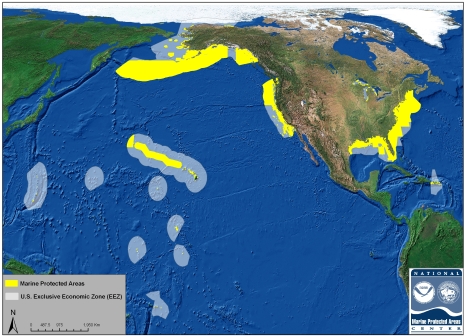 The National Oceanic and Atmospheric Administration (NOAA), in consultation with the Department of the Interior, has appointed ten new members to the Marine Protected Areas (MPA) Federal Advisory Committee. The 20-member committee is composed of individuals with diverse backgrounds and experience who advise the departments of commerce and the interior on ways,,, Read the rest here 19:20
The National Oceanic and Atmospheric Administration (NOAA), in consultation with the Department of the Interior, has appointed ten new members to the Marine Protected Areas (MPA) Federal Advisory Committee. The 20-member committee is composed of individuals with diverse backgrounds and experience who advise the departments of commerce and the interior on ways,,, Read the rest here 19:20
Three Sites Under Study (Siege) As Marine Sanctuaries in Waters Off Vineyard
 An Island-based group that includes fishermen ( a very loose term), a documentary filmmaker and a world-renowned oceanographer are leading an unprecedented effort to create three marine protected areas in waters south of the Vineyard. Read more here (boston globe photo) 09:40
An Island-based group that includes fishermen ( a very loose term), a documentary filmmaker and a world-renowned oceanographer are leading an unprecedented effort to create three marine protected areas in waters south of the Vineyard. Read more here (boston globe photo) 09:40
SAFMC halts MPA effort, includes catch shares in top ten list
 The SAFMC has been pushed hard for over two years by radical environmental groups like the Natural Resources Defense Council, Environmental Defense Fund, and Pew to approve the proposed MPAs even though the SAFMC’s own scientific advisors have said there is no scientific justification. It is of great concern that at last week’s SAFMC meeting, when council members submitted their top three issues/solutions as part of the snapper-grouper fishery “visioning” process, catch shares made it into the top ten issues for consideration. Read more here 14:04
The SAFMC has been pushed hard for over two years by radical environmental groups like the Natural Resources Defense Council, Environmental Defense Fund, and Pew to approve the proposed MPAs even though the SAFMC’s own scientific advisors have said there is no scientific justification. It is of great concern that at last week’s SAFMC meeting, when council members submitted their top three issues/solutions as part of the snapper-grouper fishery “visioning” process, catch shares made it into the top ten issues for consideration. Read more here 14:04
Marine protected areas not holding up
 “The Canadians and the people in Newfoundland, we have to be open to this,” said Rodolphe Devillers, lead author for the study undertaken by those researchers. “It’s either we want to make the sacrifices safe in terms of access to parts of the water, or then we have to accept that we’re not going to make no difference to conservation and that fish is slowly going to disappear.” Read more here 08:08
“The Canadians and the people in Newfoundland, we have to be open to this,” said Rodolphe Devillers, lead author for the study undertaken by those researchers. “It’s either we want to make the sacrifices safe in terms of access to parts of the water, or then we have to accept that we’re not going to make no difference to conservation and that fish is slowly going to disappear.” Read more here 08:08
Marine Protected Areas deemed largely ineffective
Protecting large, isolated areas of no-take zones for over 10 years with strong enforcement is the key to effective Marine Protected Areas (MPAs), according to a letter published this week in Nature. However, 59% of all MPAs meet less than three of the five criteria, making them protected in name only. Read [email protected] 20:51







 Former Fisheries Minister Ben Bradshaw recently led the charge to resurrect the campaign for the immediate designation and implementation of 127 marine conservation zones around the UK. In a confused and somewhat bizarre article in the Independent, he made the argument that marine protected areas were the solution, not just for not just managing fisheries but for just about everything other ill on the planet, including climate change.
Former Fisheries Minister Ben Bradshaw recently led the charge to resurrect the campaign for the immediate designation and implementation of 127 marine conservation zones around the UK. In a confused and somewhat bizarre article in the Independent, he made the argument that marine protected areas were the solution, not just for not just managing fisheries but for just about everything other ill on the planet, including climate change. 


























